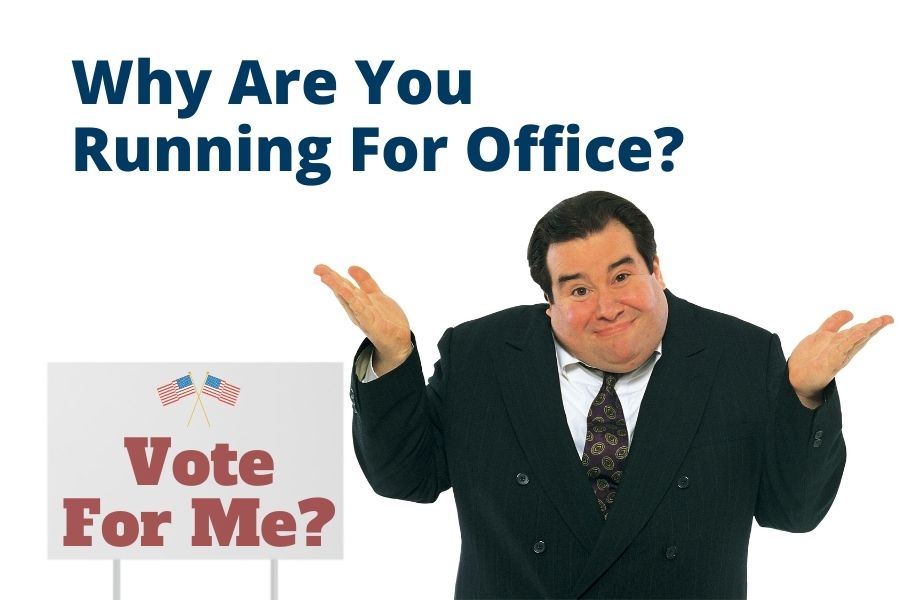Whether you are aiming for city council, Congress, or even President of the United States, one of the first questions that any candidate is asked is, “Why are you running for office?”
It’s not an easy question.
Believe it or not, many political candidates can’t provide a good reason for why they are running for elected office. A large factor in the success of any campaign is messaging. Without being able to articulate a reason for your candidacy, you’ll struggle to gain strong supporters to help your campaign.
After all, if you can’t explain why you are running, then what reason would voters have to elect you?
I am running for office because…
There are many motivations for political candidates, ranging from the benevolent to the selfish. Some people run for office because they may have personal animosity toward the incumbent or their local government at large. They feel the best way to solve the problem is to do the job themselves – and stick it to the opposition at the same time.
Others run because there is a particular issue that they care about. It might be a community-wide concern or something more focused, but either type of issue can drive a strong candidacy when it aligns with voter priorities.
Your motivation usually becomes the backbone of your campaign message and the foundation of your issues platform. When your answer reflects the concerns that your voters already have, like taxes, schools, safety, growth, or transparency, it becomes easier for people to connect with your campaign.
Consider the best answer to ‘Why am I running for office?” What matters most to you, and how will your work improve life for the people you hope to represent?
- Generic reasons like, “I want to give back to the community” or “I want to make a difference” are bland and will not generate voter interest.
- “I was asked to be a candidate by the party.” This is a terrible explanation and only signals that you are a put-up candidate just to fill an open slot on the ballot.
- “I am making a run for elected office because I want to make a difference in the lives of the people that need help.” That’s better, but it lacks specifics.
A stronger answer ties your personal experiences to a clear, community-focused goal. For example, a nurse running for county legislature might say, “I’ve spent 20 years caring for families in this community, and I’m running to strengthen local health services, protect our seniors, and ensure mental health support is affordable for everyone.”
Here’s another example: “I am running for town board because I’ve lived here all my life. As a homeowner and parent, I want to keep this town a great place to raise a family. My background in finance and community service has prepared me to be an effective town board member. I will work hard and make sure your voice is heard.”
This statement ties into who you are, what ties you to the community, and why a voter should support you.
When you put together a longer explanation that reflects your background, experiences, and goals, you’re building the foundation for your candidate biography.. That same narrative often becomes the heart of your stump speech and strengthens your credibility with voters.
What do you want to do if you win the election?
This is a slightly different question, but it ties in closely with the first. Why you seek office is only part of the story. The consequences of winning an election are the other half.
Voters want to know what’s in it for them. If you have a specific policy or goal you want to achieve once you are elected, you should be prepared to talk about it.
Clear goals make it easier for voters to remember you and repeat your message to others. They also support message discipline during debates, interviews, canvassing conversations, and community forums.
A school board candidate might say, “I’m running to improve literacy rates, support teachers, and make sure families have a voice in budget decisions.”
When your goals and motivation support each other, this builds a case for what you stand for and how voters will benefit from electing you.
Work on your elevator pitch
A candidate’s elevator pitch is longer than a slogan but shorter than a full personal biography. You should prepare a brief statement that articulates your reasons for running. This statement should be concise enough to remember and share on the spot.
You can base your elevator pitch on your candidate bio. Simply strip it down and rewrite it in just a few sentences.
Once you have it created, memorize your pitch and have it ready to repeat when you need it. You’ll use it constantly—at town halls, door-to-door canvassing, media interviews, debates, and even casual conversations with community members. As you get more comfortable, you’ll be able to tell your story easily and succinctly.
Before You commit
There are bad reasons to run and good reasons to get into politics. Not only have local candidates been tripped up when answering why they want to be elected, but so has at least one presidential candidate.

A clear, well-defined motivation shows credibility and reassures voters that you’re running for the right reasons.
If you can’t come up with a solid answer of what you hope to accomplish in office, then perhaps you should reconsider running at all.
FAQ: Crafting a Strong and Credible Reason for Running
How do I know if my reason for running is strong enough to build a campaign around?
A strong reason should meet three benchmarks:
- It matters to voters, not just to you.
- It connects to something you’ve lived, not something you researched last week.
- It leads naturally into what you will do in office.
If your answer hits all three, it has the weight needed to support your message discipline, stump speech, and issues platform.
Can my reason for running be based on frustration, or does it have to be inspirational?
Frustration can be a powerful motivator, but it must be framed constructively. Voters respond well when a candidate says, “I’m running because I’m tired of seeing this issue ignored—and I have a plan to fix it.”
They respond poorly when it sounds punitive or personal. A campaign built solely around anger lacks staying power and rarely attracts volunteers or donors.
What if I’m running because no one else stepped up?
This is common, especially in smaller races, but it’s not compelling on its own. Turn “Someone had to run” into “Someone who understands this community had to run—and here’s why I’m the person who can do the job well.”
Your willingness may open the door, but your competence and connection have to walk through it.
How specific should I be when explaining why I’m running?
Be specific enough that voters can picture the outcome.
- “Better schools” is vague.
- “Every third grader reading at grade level and restoring tutoring funds” is concrete.
Clarity sends a message: you’ve done your homework and you’re serious about governing—not just campaigning.
Can I have more than one reason for running?
Yes, but you need one primary reason for public messaging. Voters remember simple stories. Your core motivation should act like a magnet that attracts your supporting issues, not a bag of unrelated points that you carry around. Multiple motivations are fine internally—but externally, clarity wins.
How do I balance personal motivations with voter-centered messaging?
You start with your personal story, but you finish with the voter’s benefit. For example: “I’m running because I’ve seen firsthand how the cost of housing is rising. I want to make sure every family here can afford to stay in the community they love.” If the sentence ends with “I,” it’s incomplete. If it ends with “you,” that’s a lot better.
How often should I repeat my reason for running?
More than you think. Candidates get tired of hearing themselves and repeating their stories long before voters have heard the message. A strong reason should appear in your stump speech, literature, website, social posts, and debate answers. Repetition is part of the campaign.
« So You Want To Run For State Legislature? Here’s How To Get StartedIf you’d like help shaping your candidate message or building a political website that supports your campaign goals, we’re here to walk you through your options.
The Money Is In The List – Have You Started Yours? »
Tags: local campaigns, messaging








